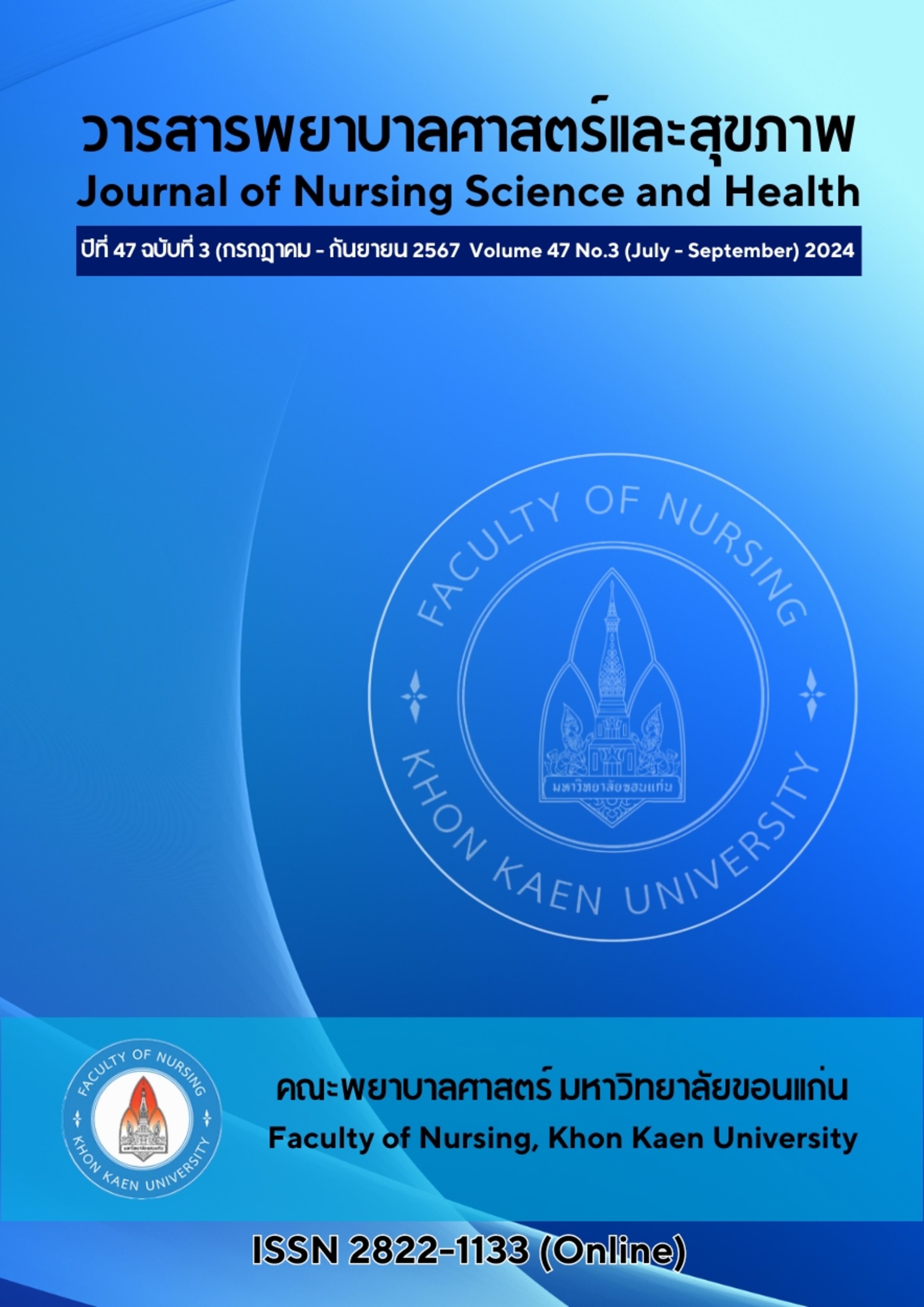ความสัมพันธ์ระหว่างการมีกิจกรรมทางสังคมกับความเสี่ยงต่อภาวะสมองเสื่อมของผู้สูงอายุ ที่อาศัยอยู่ในชุมชน ตำบลหนองหาน อำเภอหนองหาน จังหวัดอุดรธานี
คำสำคัญ:
การมีกิจกรรมทางสังคม , ชุมชน, ผู้สูงอายุ , ภาวะสมองเสื่อมบทคัดย่อ
การวิจัยเชิงสหสัมพันธ์ (correlational research) นี้ มีวัตถุประสงค์เพื่อศึกษาความสัมพันธ์ของการมีกิจกรรมทางสังคมกับความเสี่ยงต่อภาวะสมองเสื่อมของผู้สูงอายุที่อาศัยอยู่ในชุมชน ตำบลหนองหาน อำเภอหนองหาน จังหวัดอุดรธานี กลุ่มตัวอย่าง คือ ผู้ที่มีอายุ 60 ปีขึ้นไป ทั้งเพศชายและเพศหญิงที่อาศัยอยู่ในพื้นที่ชุมชน ตำบลหนองหาน อำเภอหนองหาน จังหวัดอุดรธานี จำนวน 240 คน เก็บรวบรวมข้อมูล ระหว่างเดือนเมษายน ถึงเดือนมิถุนายน พ.ศ.2566
เครื่องมือการวิจัย ประกอบด้วย 1) แบบสอบถามข้อมูลทั่วไป 2) แบบประเมินความสามารถในการทำกิจวัตรประจำวันพื้นฐาน 3) แบบประเมินสมรรถภาพสมอง (The mental state examination: MSET-10) ฉบับภาษาไทย 4) แบบประเมินการรับรู้และความเข้าใจ (The montreal cognitive assessment: MoCA) ฉบับภาษาไทย และ 5) แบบสัมภาษณ์การมีกิจกรรมทางสังคมของผู้สูงอายุ ที่ผู้วิจัยพัฒนาขึ้นจากการทบทวนวรรณกรรมและกรอบการพัฒนาเครื่องมือวิจัย เครื่องมือนี้ผ่านการตรวจสอบจากผู้ทรงคุณวุฒิได้ค่าดัชนีความตรงตามเนื้อหา เท่ากับ 1.00 และหาค่าความเที่ยงแบบสัมประสิทธิ์แอลฟ่าของครอนบาค มีค่าเท่ากับ 0.799 วิเคราะห์ข้อมูลด้วยสถิติเชิงพรรณนา (descriptive statistics) และหาสัมประสิทธิ์สหสัมพันธ์เชิงอันดับของสเปียร์แมน
ผลการวิจัยพบว่า ระดับการมีกิจกรรมทางสังคมมีความสัมพันธ์ทางบวกในระดับต่ำกับความเสี่ยงต่อการเกิดภาวะสมองเสื่อมอย่างมีนัยสำคัญทางสถิติ (r=0.233, p<.001) การมีกิจกรรมทางสังคม ประเภทที่ 1, 2 และ 3 มีความสัมพันธ์ทางบวกในระดับต่ำมากกับความเสี่ยงต่อการเกิดภาวะสมองเสื่อมอย่างมีนัยสำคัญทางสถิติ (r=0.201, p=<.002; r=0.181, p=0.005; และ r=0.133, p<.040) ตามลำดับ
เอกสารอ้างอิง
National Statistical Office Thailand. Demographic statistics population and housing [Internet]. Bangkok: National Statistical Office Thailand; 2023 [updated 2022; cited 2024 Apirl 15]. Available from: http://www.nso.go.th/sites/2022/ (in Thai)
Foundation of Thai Gerontology Research and Development institute (TGRI). Situation of the Thai older persons 2021. Nakhon Pathom: Institute for Population and Social Research Mahidol University; 2022.
Office of the National Economic and Social Development Council. Thailand population estimation report, 2010-2040 (revised edition). Bangkok: Office of the National Economic and Social Development Council; 2019. (in Thai)
Srithanyarat W, Arunsaeng P, Leethongin M, Piyawatanaphong S, Subindee S, Kumniyom N. et al. Research project to develop a comprehensive care system for the elderly with dementia case study of Ban Fang district Khon Kaen province. (research report). Khon Kaen: Klungnana; 2017. (in Thai)
World Health Organization [WHO]. Dementia [Internet]. Geneva: WHO; 2020[updated 2020; cited 2020 November 14]. Available from: https://www.who.int/news-room/fact-sheets/detail/dementia
Alzheimer’s Disease International. World alzheimer report 2015: the global impact of dementia, an analysis of prevalence, incidence, cost and trends [Internet]. USA: Alzheimer’s Disease International; 2015[updated 2015; cited 2021 March 11]. Available from: http://www.alz.co.uk /worldreport2015corrections
World Health Organization. International statistical classification of diseases and related health problems 10th Revision (ICD-10)-WHO Version 2019 [Internet]. Geneva: WHO; 2019 [updated2019; cited 2020 November 14]. Available from: http://apps.who.int/classifications/icd10/browse/2019
Fymat AL. Demetria: A review. J Clin Psychiatr Neurosci 2018;1(3):27-34.
Kelly ME, Duff H, Kelly S, Power JE, Brennan S, Lawlor BA, et al. The impact of social activities, social networks, social support and social relationships on the cognitive functioning of healthy older adults: A systematic review. Syst Rev 2017;6:259.
Sommerlad A, Kivimäki M, Larson EB, Rohr S, Shirai K, Singh-Manoux A, et al. Social participation and risk of developing dementia. Nat Aging 2023;3:532–45.
Muangpaisan M. Gerontology and geriatrics for primary care of elderly patients. Bangkok: Parbpim; 2019. (in Thai)
Department of Mental Health, Ministry of Public Health. Training facilitator's guide on depressive patient service system for nurses/ public health academics/ public health officer [internet]. Nonthaburi: Department of Mental Health, Ministry of Public Health; 2015 [updated 2015; cited 2019 November 15] Available from: https://kku.world/kib2x (in Thai)
Department of Medical Services, Ministry of Public Health. Elderly health screening and assessment guide. Bangkok: Veterans Organization Printing Welfare; 2021. (in Thai)
Krejcie RV, Morgan DW. Determining sample size for research activities. Educational and Psychological Measurement 1970;30(3):607-10.
Thongvajira C, Tophon S, Kwanyuen R, Nipatthahatphong S. Prevalence of factors associated with dementia in the elderly and development of a manual for providing knowledge: a case study of Bang Phlat District Community. Bangkok: Suan Dusit University; 2016. (in Thai)
Sapbamrer R. Public health research methods. Bangkok: Odeon Store; 2016. (in Thai)
Lawton MP, Brody EM. Assessment of older people: self-maintaining and instrumental activities of daily living. The Gerontologist 1969:9(3):179–86.
Phanasathit M. Validity and reliability of lawton instrumental activities of daily living scale (L-IADL) and older people's quality of life questionnaire (OPQOL-Brief): Thai version [internet]. Bahgkok: Thammasat University Hospital; 2017[updated 2017; cited 2020 November 10]. Available from: https://kku.world/piwa6 (in Thai)
Boongird P. Interesting about dementia. Dementia Association of Thailand Newsletter 2018;10:1-4.
Wongpakaran N. Mental State Examination T10 (MSET10) [internet]. 2021 [updated 2021; cited 2020 November 10]. Available from: https://www.wongpakaran.com/images/sub_1550692605/MSET10_GPsy_8Mar2021.pdf
Nasreddine ZS, Phillips NA, Bédirian V, Charbonneau S, Whitehead V, Collin I, et al. The montreal cognitive assessment, moca: a brief screening tool for mild cognitive impairment. J Am Geriatr Soc 2005;53:695–9.
MoCA Cognition. MoCA Test: Paper version [internet]. 2020 [updated 2020; cited 2020 November 10]. Available from:https://mocacognition.com/paper#paper_form_full
Thiparat W, Meng-iad S, Suwanweala S, Chuaykaew B. Factors predicting dementia preventive behavior among older adults-at-risk. JFONUBUU 2019;27(1):100-8. (in Thai)
Chanaboon S. Statistics for basic research. Khon Kaen: Khon Kaen Provincial Public Health Office; 2018. (in Thai)
Saczynski JS, Pfeifer LA, Masaki K, Korf ES, Laurin D, White L, Launer LJ. The effect of social engagement on incident dementia: the Honolulu-Asia Aging Study. Am J Epidemiol 2006;163(5):433-40.
Levasseur M, Richard L, Gauvin L, Raymond E. Inventory and analysis of definitions of social participation found in the aging literature: proposed taxonomy of social activities. Soc Sci Med 2010;71(12):2141-9.
Lemon BW, Bengtson VL, Peterson JA. An exploration of the activity theory of aging: activity types and life satisfaction among in-movers to a retirement community. J Gerontol 1972;27(4):511–23
Su S, Shi L, Zheng Y, Sun Y, Huang X, Zhang A, et al. Leisure activities and the risk of dementia: a systematic review and meta-analysis. Neurology 2022;99(15):e1651-63.
Kuiper JS, Zuidersma M, Oude Voshaar RC, Zuidema SU, van den Heuvel ER, Stolk RP, et al. Social relationships and risk of dementia: a systematic review and meta-analysis of longitudinal cohort studies. Ageing Res Rev 2015;22:39-57.
Lee SH, Kim YB. Which type of social activities may reduce cognitive decline in the elderly?: a longitudinal population-based study. BMC Geriatr 2016;16(1):165.
ดาวน์โหลด
เผยแพร่แล้ว
รูปแบบการอ้างอิง
ฉบับ
ประเภทบทความ
สัญญาอนุญาต
ลิขสิทธิ์ (c) 2024 วารสารพยาบาลศาสตร์และสุขภาพ

อนุญาตภายใต้เงื่อนไข Creative Commons Attribution-NonCommercial-NoDerivatives 4.0 International License.
วารสารพยาบาลศาสตร์และสุขภาพเป็นเจ้าของลิขสิทธิ์ในการเผยแพร่ผลงานที่ตีพิมพ์ห้ามผู้ใดนำบทความที่ได้รับการตีพิมพ์ในวารสารพยาบาลศาสตร์และสุขภาพไปเผยแพร่ในลักษณะต่าง ๆ ดังนี้ การนำบทความไปเผยแพร่ออนไลน์ การถ่ายเอกสารบทความเพื่อกิจกรรมที่ไม่ใช่การเรียนการสอน การส่งบทความไปตีพิมพ์เผยแพร่ที่อื่น ยกเว้นเสียแต่ได้รับอนุญาตจากวารสารพยาบาลศาสตร์และสุขภาพ



